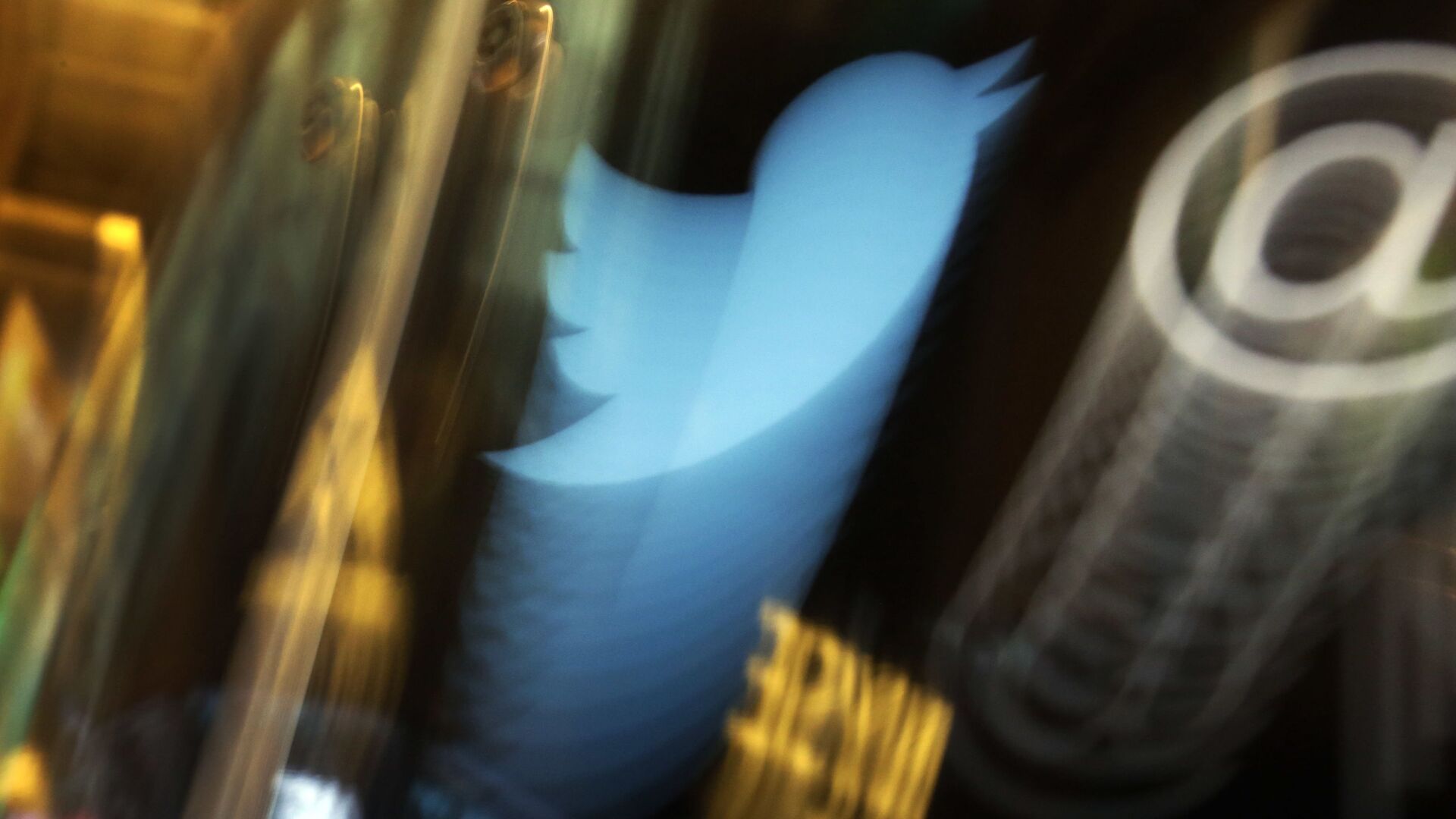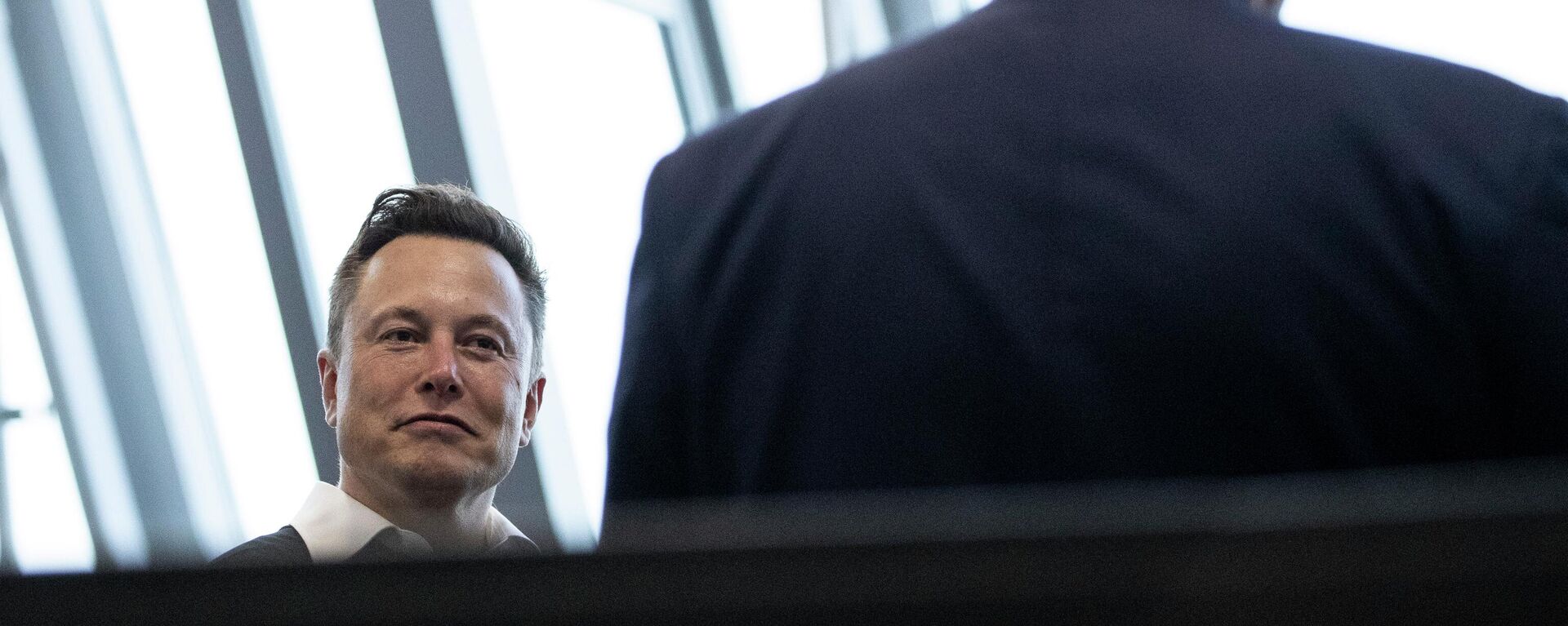https://sputnikglobe.com/20220523/distrust-for-users-choices-breeds-us-social-media-censorship-1095724420.html
Distrust for Users’ Choices Breeds US Social Media Censorship
Distrust for Users’ Choices Breeds US Social Media Censorship
Sputnik International
MOSCOW (Sputnik), Tommy Yang - As Tesla founder Elon Musk’s planned acquisition of Twitter raised new questions over the platform’s content moderation... 23.05.2022, Sputnik International
2022-05-23T18:50+0000
2022-05-23T18:50+0000
2023-04-30T05:40+0000
opinion
us
social media
twitter
censorship
https://cdn1.img.sputnikglobe.com/img/07e4/07/11/1079912867_0:0:3077:1731_1920x0_80_0_0_4bfe55997171115746eaa3a079a9d5af.jpg
When announcing his decision to purchase Twitter in April, Musk argued that he was a "free speech absolutist" who stood against censorship that went far beyond the law. Under the First Amendment of the US Constitution, most forms of speech, even hate speech or false statements, are all protected by law.Twitter’s existing content moderation policies are clearly much more restrictive compared to the kinds of speech being protected under the US constitution. Many critics expressed fears that Musk’s plan to align Twitter’s content moderation with the US constitution could lead to disinformation and hate speech flooding the platform.In response, a large number of public figures in the West, including politicians, academics and journalists, decried Musk’s intentions and vowed to quit the platform if the deal was completed.While Musk is still in the process of completing the deal with Twitter, his proposed changes renewed the heated debate over freedom of expression on social media platforms.One of the most contentious changes was Musk’s plan to reverse Twitter’s ban on former US President Donald Trump, who was blocked from the platform on January 8, 2021 due to "the risk of further incitement of violence." Twitter’s decision to ban Trump came after his supporters stormed the US Capitol two days earlier.Adherence to US ConstitutionHowever, a US expert who has defended the freedom of speech for decades called on US social media companies like Twitter to align its content moderation practices with the US Constitution.The expert acknowledged that the US constitution only prohibited the government from censorship, while Twitter, as a private company, had the freedom to choose what kind of content would be allowed on it.But the free speech expert noted that a lot of Twitter’s content moderation decisions resulted from pressure from governments.The problem lies in Twitter’s power to make such subjective decisions when removing certain content, the expert pointed out."We've seen many examples, over the past couple of years, of what was branded disinformation later turns out to be completely factually true, including very important information about COVID and very important information about political issues. The Hunter Biden laptop story is a classic example," she said.The expert expressed support for Musk’s plan to bring changes to Twitter over its content moderation practices.Paternalistic AttitudeIf the US constitution has protected different forms of speech, including hate speech and false statements, for over 200 years, why did the social media companies choose not to adhere to such standards in the first place?Professor Strossen explained that such tendencies toward censorship resulted from the distrust of users’ choices.While the US constitution can help avoid such censorship from the government, the growing powers and influence of US social media companies made it equally important to fight against censorship on those platforms, the expert argued.The expert pointed out that the electoral victory of Trump in 2016 became a turning point in the US society in terms of public opinions over censorship and content moderation on social media platforms."I think the simple answer to the question is a five-letter word, namely, Trump. This all really took a very serious downturn in 2016 when Trump was elected. I think a lot of the cultural and media elites said:’ this is a disaster.’ They couldn't believe that people have knowingly voted for Trump. They thought that this shows that people are tools of manipulation, disinformation and hate speech, we'll have to protect it against themselves. Social media were blamed for Donald Trump's election. I continue to hear this:’ that basically anybody who voted for Trump or who still supports him is a dupe at work, or racist at work.’ And I think that's disturbingly disrespectful of people's autonomy. And I say this as someone who absolutely opposes virtually everything Trump stands for, but I don't disrespect people who voted for him. I think they really were ignored to a large extent," she said.It was the same kind of paternalism logic behind such attitude toward Trump supporters, the expert added.Lessons From HistoryAlthough media reports have focused on the dangers of disinformation and hate speech on social media platforms today, Professor Strossen argued that similar threats were exaggerated whenever a new media platform emerged throughout human history.The expert detailed similar instances in the United States when new communication platforms appeared."There was a big panic in the United States. And it's certainly happened with radio, with TV, with the cable, and most recently with the internet. Every single time, you look back and you say that the dangers were completely exaggerated, but you point that out to people and they say:’ Oh, yes, we know it was exaggerated in the past, but this is really different and this time this is of a different magnitude,’ We tend to exaggerate what is unique about our own era and are unwilling to learn lessons from history, unfortunately," she said.Censorship Doesn't WorkInstead of blocking certain content, trusting people to make their own choices and offering better education to help them process different kinds of information would be a much better solution, the expert suggested."The lessons from history are that, first of all, people are not touched on getting duped. People don't automatically read something just because it's out there. So again, it goes back to the distrust of people. And then, on the other hand, all of us have cognitive biases that we are rather irrational in processing information. And the consequence of that is that censorship is not an effective solution that you have to eliminate. First of all, you can't possibly eliminate completely the supply of information. Even the most repressive government, including China, can’t do that. What you have to do is to reduce the demand for it. You have to reduce people's susceptibility to it. You have to increase people's media literacy, critical reading skills, research skills of accurate information," she said.The expert pointed out the advantage of the internet age today.And Professor Strossen argued that heavy censorship would be counterproductive when it comes to dealing with dangerous information."There was a meta analysis that was done of empirical studies about the impact of censorship or blocking on social media, including of disinformation. And not surprisingly, studies show that it has absolutely no positive impact at all. And may well have a negative impact, because what it does is when you remove these people from the mainstream platforms, they're driven to more fringe platforms where their views are not subject to questioning. And they don't have [an] opportunity for criticism and they don't have opportunities to interact with people who disagree with their views. They become more like echo chambers," she said.The expert explained how censorship could strengthen their beliefs.In light of the tragic shooting in Buffalo, New York that killed 10 people and injured three others, the state’s attorney general, Letitia James, launched an investigation into social media companies in connection with the attack last week.But how the suspect became radicalized on various social media platforms showed that censorship on mainstream platforms such as Facebook (banned in Russia as an extremist organization), Twitter or YouTube failed to stop him from accessing such information on alternative platforms, including Twitch, 4chan, 8chan and Discord.Professor Strossen noted that a recent study showed that each time certain fringe views are censored on various platforms, people holding such views could easily find new platforms to share similar views with each other. From her point of view, censorship could never be sufficient in completely blocking such dangerous views.
https://sputnikglobe.com/20220519/twitter-introduces-policy-to-prevent-spreading-of-misinformation-during-crises-1095641025.html
https://sputnikglobe.com/20220515/trump-on-musks-takeover-only-a-stupid-person-would-buy-twitter-for-that-price-1095529345.html
https://sputnikglobe.com/20220521/tech-elites-billionaires-grow-apart-from-us-democrats-due-to-lefts-censorship-division-1095685761.html
Sputnik International
feedback@sputniknews.com
+74956456601
MIA „Rosiya Segodnya“
2022
Sputnik International
feedback@sputniknews.com
+74956456601
MIA „Rosiya Segodnya“
News
en_EN
Sputnik International
feedback@sputniknews.com
+74956456601
MIA „Rosiya Segodnya“
Sputnik International
feedback@sputniknews.com
+74956456601
MIA „Rosiya Segodnya“
opinion, us, social media, twitter, censorship
opinion, us, social media, twitter, censorship
Distrust for Users’ Choices Breeds US Social Media Censorship
18:50 GMT 23.05.2022 (Updated: 05:40 GMT 30.04.2023) MOSCOW (Sputnik), Tommy Yang - As Tesla founder Elon Musk’s planned acquisition of Twitter raised new questions over the platform’s content moderation policies, a US civil liberties expert told Sputnik that US social media companies started to lean toward censorship because they did not trust their users’ choices.
When announcing his decision to purchase Twitter in April, Musk argued that he was a "free speech absolutist" who stood against censorship that went far beyond the law. Under the First Amendment of the US Constitution, most forms of speech, even hate speech or false statements, are all protected by law.
Twitter’s existing content moderation policies are clearly much more restrictive compared to the kinds of speech being protected under the US constitution. Many critics expressed fears that Musk’s plan to align Twitter’s content moderation with the US constitution could lead to disinformation and hate speech flooding the platform.
In response, a large number of public figures in the West, including politicians, academics and journalists,
decried Musk’s intentions and vowed to quit the platform if the deal was completed.
While Musk is still in the process of completing the deal with Twitter, his proposed changes renewed the heated debate over freedom of expression on social media platforms.
One of the most contentious changes was Musk’s plan to reverse Twitter’s ban on former US President Donald Trump, who was blocked from the platform on January 8, 2021 due to "the risk of further incitement of violence." Twitter’s decision to ban Trump came after his supporters stormed the US Capitol two days earlier.
Adherence to US Constitution
However, a US expert who has defended the freedom of speech for decades called on US social media companies like Twitter to align its content moderation practices with the US Constitution.
"I, and others, strongly urge these powerful social media companies given the dominant role that they play in our civic discourse and our political discourse. We urge them to adhere to standards that are very similar to First Amendment free speech standards, and certainly not to engage in, what is called when the government does that, viewpoint discrimination. They should not delete messages or d-platform figures because of disapproval or disagreement or dislike of the viewpoint, of the idea, of the perspective that they convey," Nadine Strossen, a John Marshall Harlan II Professor of Law at the New York Law school who served as the national president of the American Civil Liberties Union (ACLU) from 1991 to 2008, told Sputnik.
The expert acknowledged that the US constitution only prohibited the government from censorship, while Twitter, as a private company, had the freedom to choose what kind of content would be allowed on it.
But the free speech expert noted that a lot of Twitter’s content moderation decisions resulted from pressure from governments.
"There's a lot of evidence and information that this is, in fact, what is happening on social media companies’ [platforms]. Most disturbingly, in response to pressure from government, increasing pressure from politicians, government officials over the last couple of years, the platforms are taking down more and more [of] what is called hate speech, or disinformation or extremist speech. All of those are incredibly subjective terms. They have no agreed upon legal definition. And they become opportunities to take down any speaker or idea that is politically unpopular and politically controversial," she said.
The problem lies in Twitter’s power to make such subjective decisions when removing certain content, the expert pointed out.
"We've seen many examples, over the past couple of years, of what was branded disinformation later turns out to be completely factually true, including very important information about COVID and very important information about political issues. The Hunter Biden laptop story is a classic example," she said.
The expert expressed support for Musk’s plan to bring changes to Twitter over its content moderation practices.
"For those of us who support free speech both for the platforms themselves, but also for the rest of us who are so dependent on these platforms, to have an opportunity to post our thoughts and information and to receive it from others because free speech entails the right to receive information or ideas as well as to communicate, it was a breath of fresh air for Musk to say he wanted to do the free speech standards within the bounds of the law. He said that expressly," she said.
If the US constitution has protected different forms of speech, including hate speech and false statements, for over 200 years, why did the social media companies choose not to adhere to such standards in the first place?
Professor Strossen explained that such tendencies toward censorship resulted from the distrust of users’ choices.
"First of all, on the key word ‘choice,’ I want to underscore that that is the essence of freedom of speech, the right of a mature individual to voluntarily choose what he or she wants to say and not say, and to receive and not receive. That's the essence of the freedoms that we're talking about. And why is it that there is such distrust of and hostility toward that freedom is, precisely as you say, [because of] certain powerful forces in society, whether they are the government or the Communist Party in China or the powerful political and cultural elites in the United States? There is a paternalism, a condescension and an arrogance that we know better what is good for people than people know for themselves," she said.
While the US constitution can help avoid such censorship from the government, the growing powers and influence of US social media companies made it equally important to fight against censorship on those platforms, the expert argued.
"The First Amendment law is very strong and effective curbs against government censorship. The difference between our country and China or most other countries of the world, we had the strongest free speech protection against government, but given the rise of power and influence on the part of these not only social media companies, but also social forces, the so-called Twitter mob, these are also private sector forces. We have to look to another source of protection other than the Constitution. Namely, we have to change the culture somehow and that's why I'm constantly evangelizing on these issues," she said.
The expert pointed out that the
electoral victory of Trump in 2016 became a turning point in the US society in terms of public opinions over censorship and content moderation on social media platforms.
"I think the simple answer to the question is a five-letter word, namely, Trump. This all really took a very serious downturn in 2016 when Trump was elected. I think a lot of the cultural and media elites said:’ this is a disaster.’ They couldn't believe that people have knowingly voted for Trump. They thought that this shows that people are tools of manipulation, disinformation and hate speech, we'll have to protect it against themselves. Social media were blamed for Donald Trump's election. I continue to hear this:’ that basically anybody who voted for Trump or who still supports him is a dupe at work, or racist at work.’ And I think that's disturbingly disrespectful of people's autonomy. And I say this as someone who absolutely opposes virtually everything Trump stands for, but I don't disrespect people who voted for him. I think they really were ignored to a large extent," she said.
It was the same kind of paternalism logic behind such attitude toward Trump supporters, the expert added.
"There's this sense of paternalism. We know better what’s good for you than you do for yourself. So we're gonna protect you against what you think is your own choice, but it really shouldn't be your choice," she said.
Although media reports have focused on the dangers of disinformation and hate speech on social media platforms today, Professor Strossen argued that similar threats were exaggerated whenever a new media platform emerged throughout human history.
"I think that, over and over again in history, people show a historical ignorance. I sometimes call it historical hubris, which is to think:’ oh, this was the first time this has ever happened in human history. Maybe it happened before, but it's just so much more dangerous now than it was before.’ That has happened with every single new medium of communication, going as far back as the printing press. My husband says it goes back as far as the invention of papyrus. Anything that makes it easier to reach a larger audience, including people who are not part of the elite, including children, there's a panic on the part of those who have traditionally wielded power saying:’ oh, you know, all this is so dangerous," she said.
The expert detailed similar instances in the United States when
new communication platforms appeared."There was a big panic in the United States. And it's certainly happened with radio, with TV, with the cable, and most recently with the internet. Every single time, you look back and you say that the dangers were completely exaggerated, but you point that out to people and they say:’ Oh, yes, we know it was exaggerated in the past, but this is really different and this time this is of a different magnitude,’ We tend to exaggerate what is unique about our own era and are unwilling to learn lessons from history, unfortunately," she said.
Instead of blocking certain content, trusting people to make their own choices and offering better education to help them process different kinds of information would be a much better solution, the expert suggested.
"The lessons from history are that, first of all, people are not touched on getting duped. People don't automatically read something just because it's out there. So again, it goes back to the distrust of people. And then, on the other hand, all of us have cognitive biases that we are rather irrational in processing information. And the consequence of that is that censorship is not an effective solution that you have to eliminate. First of all, you can't possibly eliminate completely the supply of information. Even the most repressive government, including China, can’t do that. What you have to do is to reduce the demand for it. You have to reduce people's susceptibility to it. You have to increase people's media literacy, critical reading skills, research skills of accurate information," she said.
The expert pointed out the advantage of the internet age today.
"And there, the internet and social media provide unparalleled resources for the ability to do that. And fortunately, there is a proliferation now, of resources, educational materials, educational programs, and some states are requiring it as part of the curriculum from the earliest ages for people to do a better job at seeking out and analyzing and processing information, opinion and analysis. The teach and education approach, as opposed to the censorship approach, is not only more consistent with individual liberty and democracy, but it's also more effective," she said.
And Professor Strossen argued that heavy censorship would be counterproductive when it comes to dealing with dangerous information.
"There was a meta analysis that was done of empirical studies about the impact of censorship or blocking on social media, including of disinformation. And not surprisingly, studies show that it has absolutely no positive impact at all. And may well have a negative impact, because what it does is when you remove these people from the mainstream platforms, they're driven to more fringe platforms where their views are not subject to questioning. And they don't have [an] opportunity for criticism and they don't have opportunities to interact with people who disagree with their views. They become more like echo chambers," she said.
The expert explained how censorship could strengthen their beliefs.
"When you censor them, that reinforces their sense of victimhood, which is always a big part of the narrative for these isolated people who become radicalized, and some of them commit violent acts. And their conspiracy theories become reaffirmed," she said.
In light of the tragic shooting in Buffalo, New York that killed 10 people and injured three others, the state’s attorney general, Letitia James, launched an investigation into social media companies in connection with the attack last week.
But how the suspect became radicalized on various social media platforms showed that censorship on mainstream platforms such as Facebook (banned in Russia as an extremist organization), Twitter or YouTube failed to stop him from accessing such information on alternative platforms, including Twitch, 4chan, 8chan and Discord.
Professor Strossen noted that a recent study showed that each time certain fringe views are censored on various platforms, people holding such views could easily find new platforms to share similar views with each other. From her point of view, censorship could never be sufficient in completely blocking such dangerous views.






